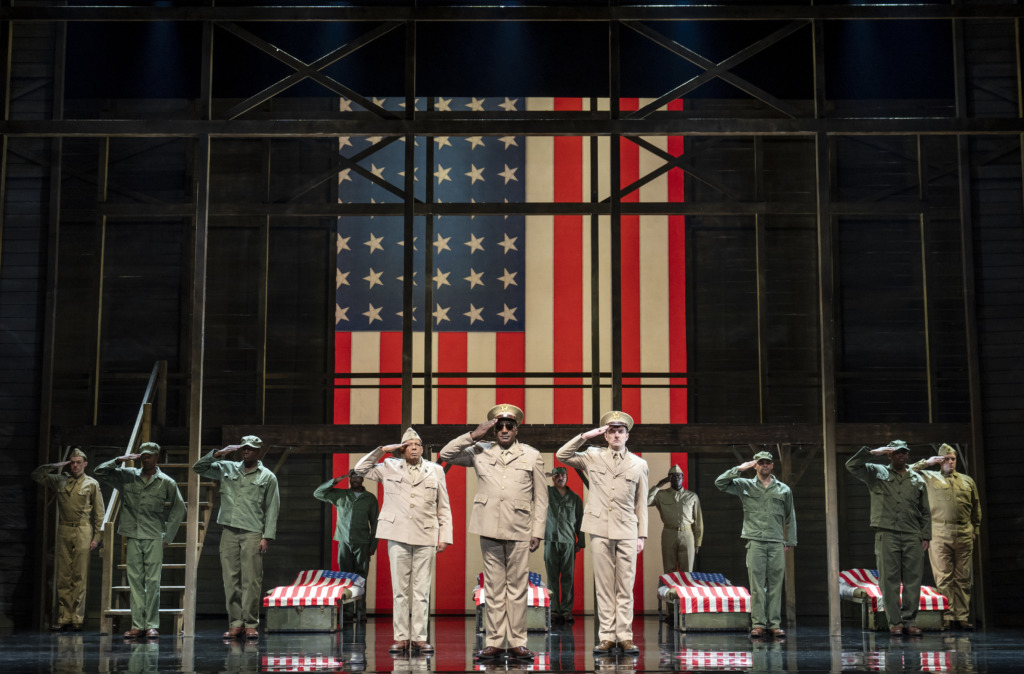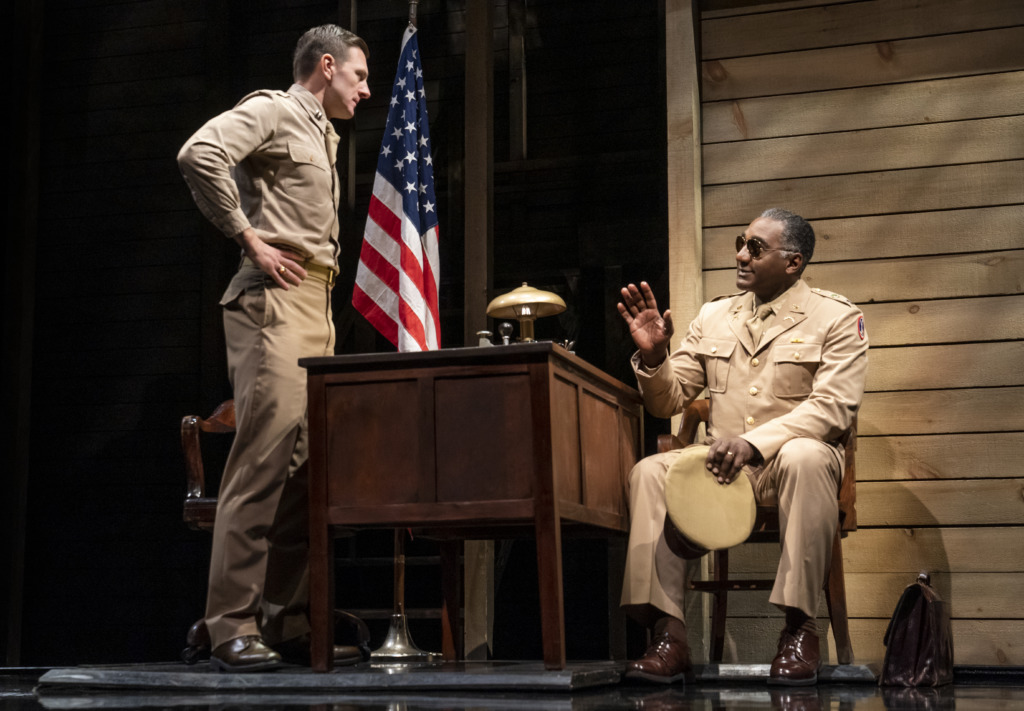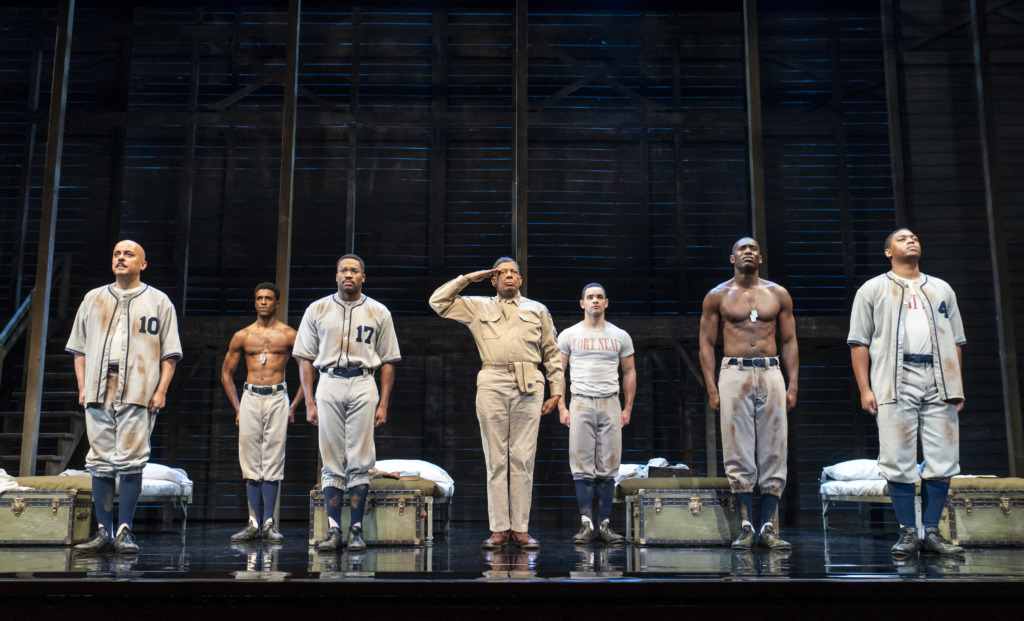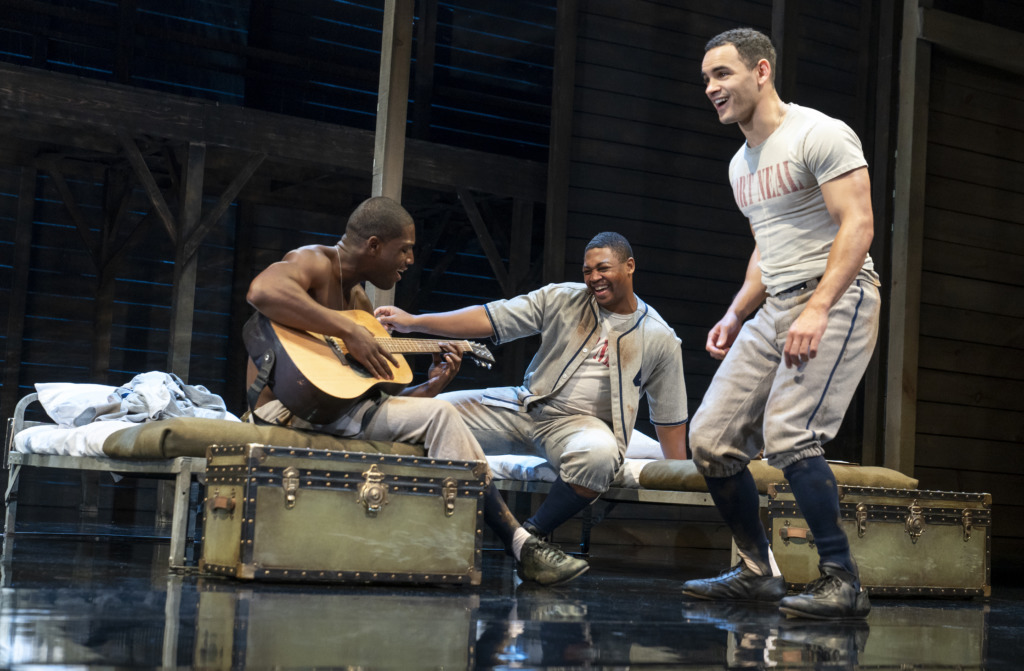“Any man ain’t sure where he belongs must be in a whole lotta pain.”
“War! Huh, (good God), What is it good for?” Well, that’s a loaded question for another day. But back in 1944 on a segregated southern Louisiana Army Base, the promise of deployment to the battle front is a dream for many of our young characters of color that yearn for a chance of serving their country, and perhaps getting the chance to see a part of the world that doesn’t follow Jim Crow laws. In this tale set at the height of WWII, the story is not what is happening on the shores of Normandy or Iwo Jima, but the events happening in our own domestic backyard of Louisiana after the murder of a black Sergeant.

That’s right! A Soldier’s Play, written by Charles Fuller (who won a Pulitzer for the original 1981 rendition) and directed by Tony Award-wining Director Kenny Leon, is not just your typical run-of-the-mill theatrical drama; it is a military murder mystery. Written in a time that preceded the procedural police dramas we’ve become all too familiar with on modern-day TV, A Soldier’s Play is enacted through a series of interviews and flashbacks as the black officer charged with getting to the bottom of this murder interrogates the servicemembers closest to the victim.
Set Design by Derek McLane and Lighting Design by Allen Lee Hughes go meticulously hand in hand to create a rigid and straight-laced environment for the military base setting. Simple in its angular and minimalist nature, McLane captures the essence of Louisianian Army barracks with the suggestion of stark planked walls and uniform cots set with basic fatigue green trunks sitting at their end. Paired with Hughes’ harsh lighting, it emphasizes all the more the sharp corners of the beds made with military precision and lack of any personal possessions about. So uniform are the surroundings of these enlisted men that the only individuality in the space the audience gets to see is in the brief glimpses of the photos taped to the tops of the trunk’s inner lids when someone fleetingly opens one. Otherwise, the feeling of individuality being stripped of these young soldiers molded for war is abundantly present in their surroundings. But, while their environment may feel sterile of personality, that by no means implies that our characters are not without their own heart and souls.
While A Soldier’s Play is not a musical, it does have music interlaced within it. Mostly Blues and traditional Southern styles of music play a part in the piece, pulsing through the scenes in such a way that depicts the importance of music as the lifeblood of many black Southern cultural norms. That being said, it was an interesting transition to open the play: not with a light cue or an announcement to silence your phones (that announcement was made five minutes before the production’s start), but rather by a sudden lack of light and sound, throwing the audience into darkness while on stage a singular voice is heard singing in the near-darkness before gradually being joined by other voices to form a collective. Not unlike a scene one might imagine in a jail cell. Meanwhile, on the balcony above the stage, the audience’s first real sight is that of a man kneeling with his hands up, speaking to some unseen aggressor before two shots ring out, and we are ushered into the play proper.

Capt. Davenport, played by Norm Lewis, is a rarity for the 1944 military: an officer of color. Graduate of Howard University and a lawyer in his own right, Capt. Davenport has his orders to travel to this segregated Army Base to find the culprit (or culprits) responsible for the death of Sgt. Waters, played by Eugene Lee. Met by the white commanding officer of the regiment and the other servicemembers of color with shock and awe (respectively), Lewis finds the balance of playing a character standing up while being looked down upon, and resolute in his orders to get down to the bottom of this murder. And if I may say so, he looks damn fine in those MacArthur styled glasses.
Through a series of interviews and interrogations, Capt. Davenport questions each servicemember associated with Sgt. Waters in order to paint a picture of the man himself as well as the events leading up to the murder. As each man is allowed his chance to recount the events on Base over the last year, the audience is able to view the tellings through a series of flashbacks set to the tone of each storyteller. Whether it be a more flattering rendition of the fallen Sergeant through an anecdote by Pvt. Wilkie, played by Howard Overshown, or a messy, drunk, animalistic account by white Military Police members Lt. Byrd and Capt. Wilcox (played by Chattan Mayes Johnson and Matthew Goodrich, respectively), Lee is given a chance to not only depict his character as a layered individual through each account, but also allows him the chance to change his demeanor based on who is the one telling the story. Tasked with a challenging ordeal swathed with nuance and raw candor, Lee provides a very powerful portrayal of a character Fuller once described as a “king in a place that didn’t need a king.”
At first, the story is easy to conclude that Sgt. Waters was simply the victim of racism as a man of color with rank in the American South. All too easily, the fingers of blame can be pointed as an all-too-common lynching by the Klu Klux Klan, and everything can simply be allowed to move forward with the march of time. But with each scene, Lee’s character is revealed to be a character less and less liked by the men serving under him, and more and more likely a character someone outside of the KKK would want dead. Sgt. Waters is a complex character in the sense that he is a man that sees his own potential and self-worth to be greater than the unfair restrictions burdened around him in the Jim Crow era. Additionally, he is also a man who has simultaneously experienced racism and absorbed those very same racist attitudes toward those of his own “race” in order to inflict the very same harmful sentiments towards those he views as contributing to his own powerlessness as a black man in America. Lee steps up to this challenge and depicts himself well as a man angered by the attributes of the men of color around him whom he views as “lesser” and as a harmful set of traits set to hold him only further apart from the idyllic societal position possessed by the white men in American society. Lee allows himself to be seen as a man at conflict with these self perceived frustrations and becomes a man that is unlikable, but still human.

But if Lee is the unlikeable heel, it is Pvt. C.J. Memphis, played by Sheldon D. Brown, that balances the weight of the scales on stage. At first, Pvt. Memphis’ character may be perceived as slower in wit and gentler of nature, deciding to instead be a man who prefers to sing the Blues and hold tight to his lucky “farmer’s dust” tied about his neck rather than the aggressions of the military, but Brown’s ability to capture the nuance of Pvt. Memphis’ depth of soul will shine as a true highlight in this production. Brown excels in his portrayal of Pvt. Memphis and masterfully captures the good-natured essence of this man so despised by Sgt. Waters as “shiftless” or “clownish,” despite the fact that it is Brown’s character that is able to see the pain within the Sergeant more clearly than anyone else. Instead, Brown imbues the light of a gentle man, not slow in wit but rather perceptive of the soul, who feels and senses so much in those around him to the point that it is no wonder he is able to so wonderfully capture the soulfulness of the Blues. Brown is able to enchant the hearts of the audience as Sgt. Waters cruelly acts against him as he does, and will bring a tear to your eye and tightness to your throat in his journey.
Similarly, each other man in this production deserves more praise than there is space to mention here for each of their parts. Whether it be through Overshown’s grasp of conflict serving as Sgt. Water’s lackey as he first tries to paint a more favorable picture of the man even after his death, or Pvt. First Class Peterson, played by Tarik Lowe, as a young man who embraces his anger at injustice, or through Capt. Taylor’s, played by William Connell, awkwardness as the white officer who at first attempts to block Capt. Davenport’s orders to investigate for his own reasons, each actor in this production has a chance to both shine as a multifaceted living individual and work together as a well-constructed ensemble unit.
A final accolade worth mentioning is that A Soldier’s Play was the winner of the 2020 Tony for Best Revival. What’s that? You don’t remember the Tony’s in 2020? Well that’s because they were pushed back to being held in September 2021 for… reasons. So don’t be ashamed if this 2020 winning production didn’t land on your radar. The unfortunate truth was that it was robbed of a full run due to the conditions of its time. But now, luckily for you, the national tour of A Soldier’s Play kicks off in Washington’s very own Eisenhower Theatre at The Kennedy Center. But don’t sleep on this one! Before you know it, the cast will get their orders and they will ship out after January 8th, 2023.
Running Time: Approximately 2 hours, including one fifteen-minute intermission.
A Soldier’s Play plays through January 8th, 2023 in the Eisenhower Theatre at The John F. Kennedy Center for the Performing Arts, 2700 F Street NW, Washington, DC. For tickets call the box office at (202) 467-4600 or purchase them online.

